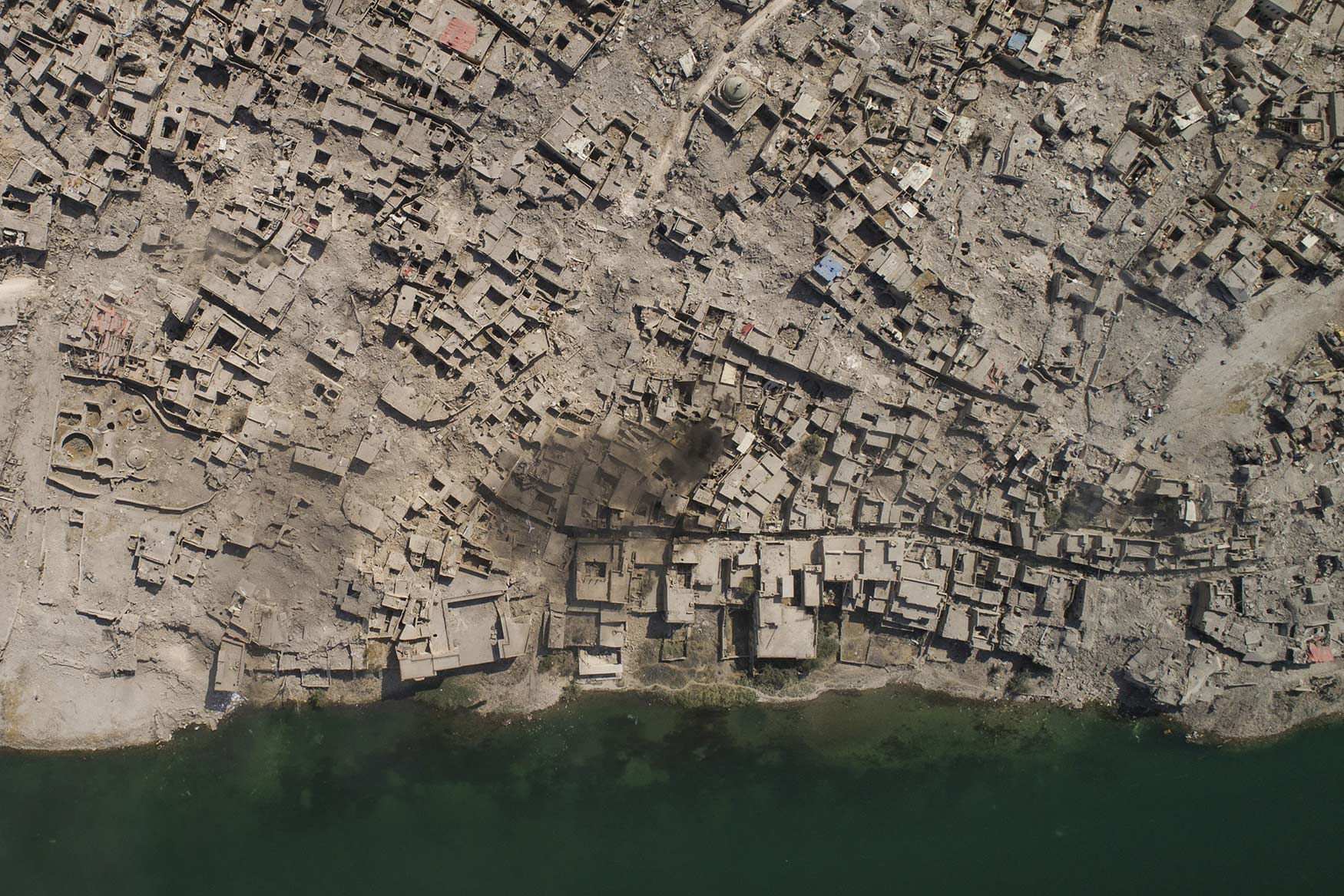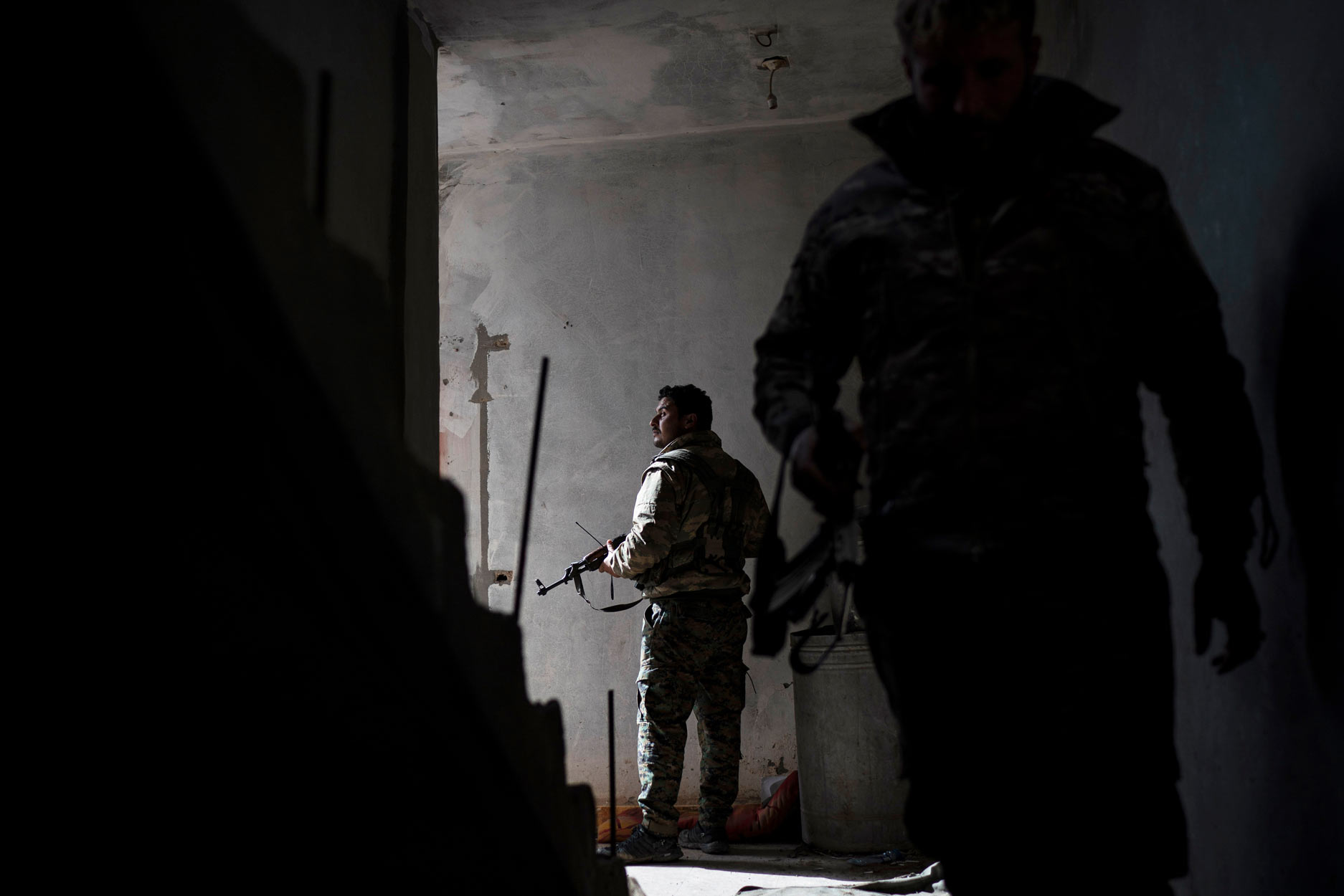After independence vote, Kurdish leaders feel under siege

Just a month ago, Iraq’s Kurds were celebrating their symbolic vote for independence as a historic step toward their decades-old dream of statehood, with enough energy reserves to guarantee generations of prosperity.
But instead of moving forward with negotiations toward a smooth divorce from Baghdad, Kurdish politicians have been humiliated with the loss of their most important oil-producing city, Kirkuk, which was taken over by Iraqi troops last week. That has squeezed an already hurting economy and dashed hopes of an independent state.
Kurdish men smoke a water pipe in central Irbil, Iraq, Wednesday, Oct. 25, 2017. In Sept. 2017, Iraq's Kurds celebrated their symbolic vote for independence, but instead of moving forward with negotiations toward a smooth divorce from Baghdad, they have lost their most important oil-producing city to Iraqi troops, squeezing a hurting economy and dashing the hopes of an independent state. (AP Photo/Felipe Dana)
Worse still, their traditional ally the U.S. and Turkey, which has traditionally maintained good relations with the Iraqi Kurds, have hardly acted to moderate against Iraq’s central government, and Kurdish leaders feel they are under siege in a world stacked decidedly against separatism.
“They want to push us into an internal war,” said Ali Awni, an adviser to Kurdish President Masoud Barzani.
U.S. Secretary of State Rex Tillerson visited Baghdad on Monday amid hopes the former Exxon executive would mediate between the Kurds and Iraq, but there were no immediate changes in the dispute.
The Kurdish peshmerga forces — so vital in recent Iraqi victories over Islamic State extremists — said Tuesday they have pushed back two advances by Iraqi federal troops and allied Iranian-backed militias toward pockets vital to the Kurdish region’s oil economy.
People are reflected in the window of a closed shop in central Irbil, Iraq, Wednesday, Oct. 25, 2017. In Sept. 2017, Iraq's Kurds celebrated their symbolic vote for independence, but instead of moving forward with negotiations toward a smooth divorce from Baghdad, they have lost their most important oil-producing city to Iraqi troops, squeezing a hurting economy and dashing the hopes of an independent state. (AP Photo/Felipe Dana)
Iraqi Prime Minister Haidar al-Abadi demands that Kurdish officials hand over a disputed pipeline between the Kurdish region and Turkey, a move that would effectively doom Kurdish oil exports and devastate the regional budget. The border with Turkey, Baghdad says, constitutionally belongs to federal authorities.
Citing the turmoil and the continued buildup of federal troops at their borders, the Kurdish parliament on Tuesday postponed elections for eight months. The government also offered to freeze the results of the controversial referendum as part of a proposed dialogue with Baghdad.
“I don’t imagine this is the right time to prepare voter lists and pick polling stations,” said Saadi Pire, a leading member of the Patriotic Union for Kurdistan (PUK) one of the two parties that effectively share control of the autonomous region’s state and security institutions.
Opponents say the PUK and President Barzani’s Kurdistan Democratic Party (KDP) are buying time to try to fix a system that is looking increasingly creaky from within. The Kurdish parliament met Tuesday for the first time since 2015 after Barzani shuttered it in a dispute with the Gorran opposition party.
Kurdish men rest outside a mosque in central Irbil, Iraq, Wednesday, Oct. 25, 2017. In Sept. 2017, Iraq's Kurds celebrated their symbolic vote for independence, but instead of moving forward with negotiations toward a smooth divorce from Baghdad, they have lost their most important oil-producing city to Iraqi troops, squeezing a hurting economy and dashing the hopes of an independent state. (AP Photo/Felipe Dana)
“They will hold elections when it suits them, and when it doesn’t they’ll come up with any number of excuses to postpone them” said Bajdar Hassan, a Gorran political operative.
Residents complain of favoritism, corruption and unpaid wages, while authorities move against dissent, harassing third parties and cajoling the media through favors and threats into positive coverage.
“No one will vote,” said Karza Nabil, a 36-year-old electrician. “The people are tired of being lied to.”
Civil servants are receiving only one-half to one-third of their pay, and in the Irbil bazaar, anyone from traffic police to school teachers could be seen hawking radios and selling coffee after hours to make ends meet.
Nabbas Kattab, 46, measures market traffic by the amount of bread in his kebab shop.
“We used to go through 1,000 loaves every day. Now, it’s only 200,” he said.
Kurdish men sit outside a tea shop in central Irbil, Iraq, Wednesday, Oct. 25, 2017. In Sept. 2017, Iraq's Kurds celebrated their symbolic vote for independence, but instead of moving forward with negotiations toward a smooth divorce from Baghdad, they have lost their most important oil-producing city to Iraqi troops, squeezing a hurting economy and dashing the hopes of an independent state. (AP Photo/Felipe Dana)
The outlook also is grim at the borders, where Kurdish leaders see a coordinated effort by the central government in Baghdad and the governments of Turkey and Iran to further isolate the landlocked Kurdish region.
The Kurdistan Security Council said Tuesday that the peshmerga pushed back an advance by federal forces in the direction of the largest remaining oil field still in Kurdish hands.
The Khurmalah oil dome was operated by the federal government’s North Oil Co. until it was given to the Kurdish regional government in 2007.
But the Kurds still have plenty of reasons to worry.
It would take just one order from Ankara to close the crude oil pipeline from the Kurdish region to Turkey to suffocate the economy, and in the wake of the Sept. 25 referendum, Turkish President Recep Tayyip Erdogan threatened to do just that.
A man sells rugs depicting Kurdish president Masoud Barzani, right, in central Irbil, Iraq, Wednesday, Oct. 25, 2017. In Sept. 2017, Iraq's Kurds celebrated their symbolic vote for independence, but instead of moving forward with negotiations toward a smooth divorce from Baghdad, they have lost their most important oil-producing city to Iraqi troops, squeezing a hurting economy and dashing the hopes of an independent state. (AP Photo/Felipe Dana)
Turkey has traditionally maintained good relations with Iraq’s Kurds, but it reacted angrily to the referendum, fearing it would fuel the Kurdish separatist movement within its own borders.
Erdogan has since backed away from his threat, but he has done little to hinder al-Abadi from taking over the pipeline from the Iraqi side of the border.
Losing Kirkuk to federal authority last week was a double blow to the Kurdish region. Baghdad called Kirkuk a “disputed city,” but in Kurdish lore it is anything but.
Under Saddam Hussein, the multi-ethnic city was targeted for the ruling Baath Party’s notorious Arabization campaigns that drove Kurds out of urban centers in northern Iraq and into their present enclave in the northeast. Kirkuk province is not recognized as a part of the Kurdish region’s autonomous zone under the 2005 Iraqi Constitution.
Photos of Kurdish president Masoud Barzani hang on the walls of the central bazaar in Irbil, Iraq, Wednesday, Oct. 25, 2017. In Sept. 2017, Iraq's Kurds celebrated their symbolic vote for independence, but instead of moving forward with negotiations toward a smooth divorce from Baghdad, they have lost their most important oil-producing city to Iraqi troops, squeezing a hurting economy and dashing the hopes of an independent state. (AP Photo/Felipe Dana)
And losing Kirkuk sliced oil production for the Kurds by more than half, from 790,000 barrels per day to 350,000, according to September figures from the Iraq Energy Institute.
Al-Abadi said he was simply applying the letter of the constitution and last week offered to bring the Kurdish leadership into talks with the central government. The PUK and KDP responded positively, but the situation in the Kurdish region has yet to change.
Baghdad, which controls Kurdish airspace, has forbidden international flights to the region, demanding that Kurdish leaders disavow their independence vote.
After reclaiming Kirkuk and other territory across northern Iraq, al-Abadi called the Kurdish referendum “a thing of the past.” But the flight restrictions still stand.
Irbil airport’s once-humming entrance hall now is eerily subdued except for the occasional echo of footsteps — a reminder to Kurdish politicians of their vulnerability to state powers and the exasperation of a humiliated electorate.
A man sits at the entrance of a mosque in central Irbil, Iraq, Wednesday, Oct. 25, 2017. In Sept. 2017, Iraq's Kurds celebrated their symbolic vote for independence, but instead of moving forward with negotiations toward a smooth divorce from Baghdad, they have lost their most important oil-producing city to Iraqi troops, squeezing a hurting economy and dashing the hopes of an independent state. (AP Photo/Felipe Dana)
Text from the AP news story, After independence vote, Kurdish leaders feel under siege, by Philip Issa.
Photos by Felipe Dana
Visual artist and Journalist






